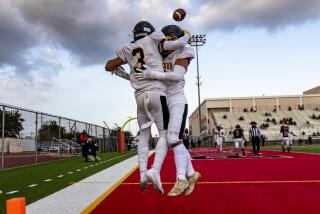THE COLLEGES / FERNANDO DOMINGUEZ : With No Reservations, Subsection 7.032 Dulls Ventura’s Hunger
- Share via
Whoever said there are no free lunches--or even snacks--must have been a sports bureaucrat.
The Ventura College football team discovered that recently.
What started harmlessly enough for the Pirates nearly turned into a costly faux pas because of a rule.
These are the basics:
Last season, the Pirates were 0-10 and scored only 36 points. They were shut out six times and only two teams failed to score at least 25 points against them.
But they have reversed their fortunes this season, and will go into Saturday night’s nonconference home game against Fresno City with a 3-0 record. They have won two games by shutout.
It was the first shutout, a 38-0 victory over West L.A. in a Western State Conference game on Sept. 10, that almost got the Pirates in trouble.
Coach George Rosales, in his second season at the helm, and his assistants promised members of the defensive unit a dinner if they held an opponent scoreless this year.
Presto!
The payoff came the following Friday night at a Ventura barbecue restaurant owned by former Pirate defensive end Charles (Buster) Davis.
When Davis heard why the players were there, he offered to give the entire team a free dinner after every victory.
Maybe those guys would eat him right out of a business, but Davis said he didn’t care. He thought they could use a square meal.
Guess what? The Pirates won again--twice.
But hold the steak sauce. Put those rolls back. The gesture by Davis, although noble, won’t fly. There are flags all over the field.
It seems that the California Community College Commission on Athletics, the governing body of junior college sports in the state, has rules about that sort of thing.
The rule is explained in the CCC’s State Athletic Code under “Section 7.03, Subsidizing.”
In essence, Subsection 7.031 states that subsidizing athletes is “strictly forbidden.” Subsection 7.032 further mentions that “the giving of special privileges to athletes, such as free or reduced rate housing, free or reduced rate meals, or any financial assistance in the form of loans or grants . . . when it is not the policy of the college to give such services to every student in the college is classed as illegal subsidizing and is strictly forbidden.”
It is a well-meaning rule. Its purpose is to keep coaches in line, to eliminate potential inequities between students and to prevent schools from favoring certain groups based on their presumed importance.
Also, at four-year colleges under NCAA scrutiny, the anti-subsidizing rules are meant to stop alumni and other outside sources with fat wallets from showering recruits with gifts and cash to play at their schools.
Few junior college athletic programs have such sugar daddies. In California, at least, two-year schools walk a financial tightrope.
Nevertheless, those are the guidelines.
The Pirates, however, won’t be penalized. Walter Rilliet, the state’s commissioner of athletics, said the apparent infraction did not call for more than a warning.
“I would look at it at this point as a good-faith thing,” Rilliet said. “But if it gets to be a long-term thing, our rules would have to apply.”
Fair enough. But the rule seems silly in this instance.
For starters, the college had nothing to do with the free meals. The idea came from Davis, who simply got caught in the excitement of the season and wanted to show his support. As a former player, he knows that incentives motivate athletes.
And what if the free meals were going to other groups on campus? Would the film department at a school be forced to forfeit a dinner party in their honor offered by, say, Steven Spielberg to celebrate an award-winning documentary?
What if Wolfgang Puck wanted to treat the home economics folks to free pastries and cappuccino to acknowledge their interest in cooking?
Nothing would likely happen because those entities are not under the microscopic eye of an athletic association.
But the Ventura football team and other junior college athletic programs have to watch their steps.
And Rosales says he will make sure there are no more potential land mines in his path: no more free meals.
“Those are the rules and my job is to make sure we follow them,” Rosales said.
More to Read
Get our high school sports newsletter
Prep Rally is devoted to the SoCal high school sports experience, bringing you scores, stories and a behind-the-scenes look at what makes prep sports so popular.
You may occasionally receive promotional content from the Los Angeles Times.






